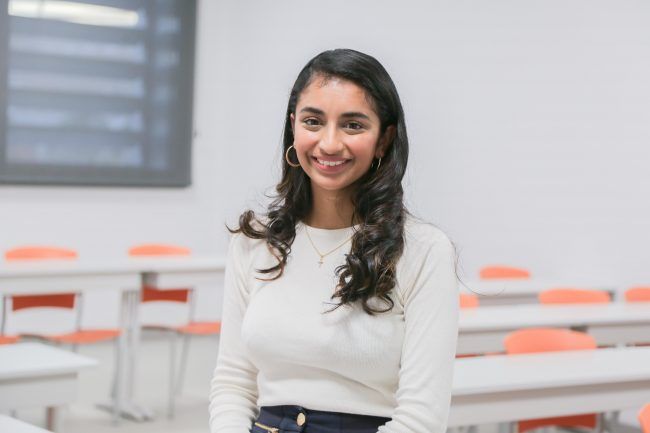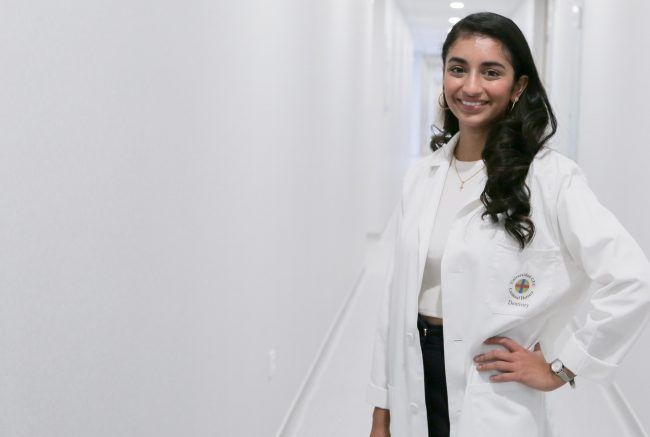Ria is a fifth-year Dentistry student from the United Kingdom. She is about to finish her studies and defines all these years as an amazing experience that she will never forget. We chat about the advantages of studying a bilingual degree, her improvement in Spanish language and we even dare to predict the future of her professional career.

Why did you decide to study dentistry?
I chose to study dentistry because I wanted to work in healthcare. I have always been passionate about wanting to make a difference in the community. Most people would think that a better career choice would be to study Medicine, but I chose Dentistry because I wanted to focus my attention on the use of fine skill, detail and precision.
How do you think the dentistry of the future will be?
Dentistry is a rapidly evolving career. This is one of the reasons I find it so interesting, it’s constantly changing and forces you to be adaptable while challenging you. I think that dentistry of the future will incorporate the introduction of new technologies and new methods of diagnosis for example, improved methods of diagnostic imaging.
Learning Spanish really helped me improve my communication skills, it has also given me a lot of confidence caring for my patients
In that sense, how do you think practices should keep up with the rapidly changing dental field?
I think it can be very tempting for practices to jump on the latest trends and movements in technology in order to attempt to deliver the best care for their patients. However, I think that it is important to be critical when employing these new techniques into your practice. It is important to do extensive research on these techniques and to critique their long-term and short term benefits for your patients and your practice. Ultimately there are many things to consider in terms of advancing your practice, another important aspect would be economics. There is no point in buying into the latest technology if it is not economically feasible and it won’t add value to your daily clinical practice.

Could you explain what an ordinary practice session looks like?
Typically, we start our clinical sessions by preparing our clinic for the patients that we have that day. We check what patients we have and the treatments they need so we can prepare our instruments for that procedure. At this point we have the opportunity to ask our clinic professors any questions about the treatments before we see the patient. The professors are always close by to help, if we are struggling or if we have difficulty conversing with the patient in Spanish. We are usually paired with a Spanish partner that can help with this too. This was particularly useful in the beginning when my Spanish wasn’t very good, but I’ve found that over time my confidence has increased and I can now comfortably talk to my patients in Spanish.
the goal is to treat patients to the best of your ability and maintain a high standard of patient care
What professional advantages do you think the fact of studying a bilingual degree will give you?
Studying a bilingual degree has definitely given me an advantage when it comes to communication. Being able to carry out the treatment and use your knowledge to diagnose patients is only half of the puzzle, the other half is being able to effectively communicate with the patient. Studying here has also allowed me to increase my understanding of Spanish culture as well as getting the opportunity to meet lots of new people from different cultures increasing my ability to connect and empathise with people of different backgrounds.
What resources has the university given you to learn Spanish?
The university provided us with Spanish classes to help us adjust to Spanish culture as well as to help teach us the language. A lot of our practicals were taught in Spanish, which although difficult in the beginning, really forced us to learn the Spanish words and phrases that we actually use in the clinic therefore helping to improve delivery of patient care.
As a professional, what skills that you have gained during your degree will help you you to deal with patients?
Ultimately, the goal is to treat patients to the best of your ability and maintain a high standard of patient care. In this sense, I think that my attention to detail; my ability to communicate and empathise; time management; manual dexterity; and enthusiasm helps me to generate good rapport with my patients and provides them with the care that they deserve.









